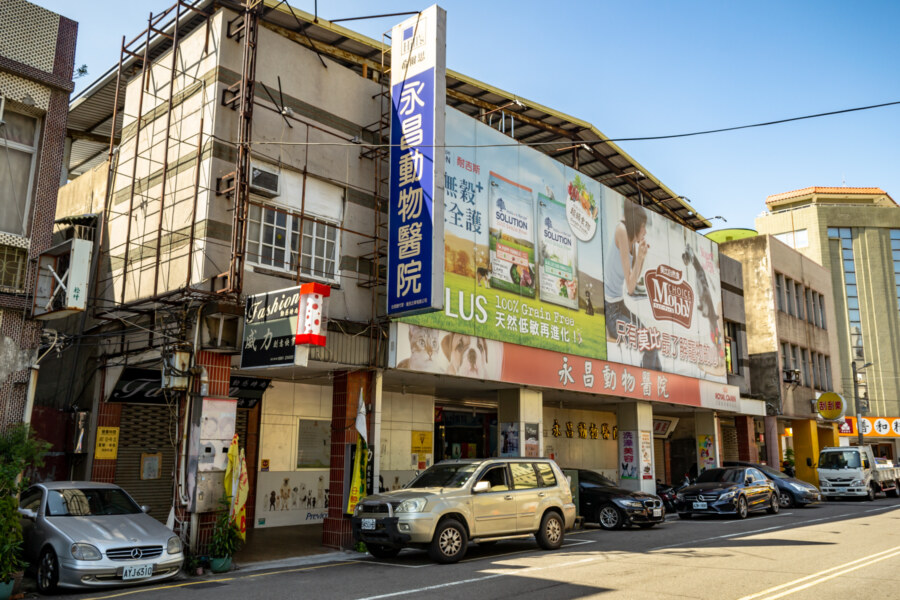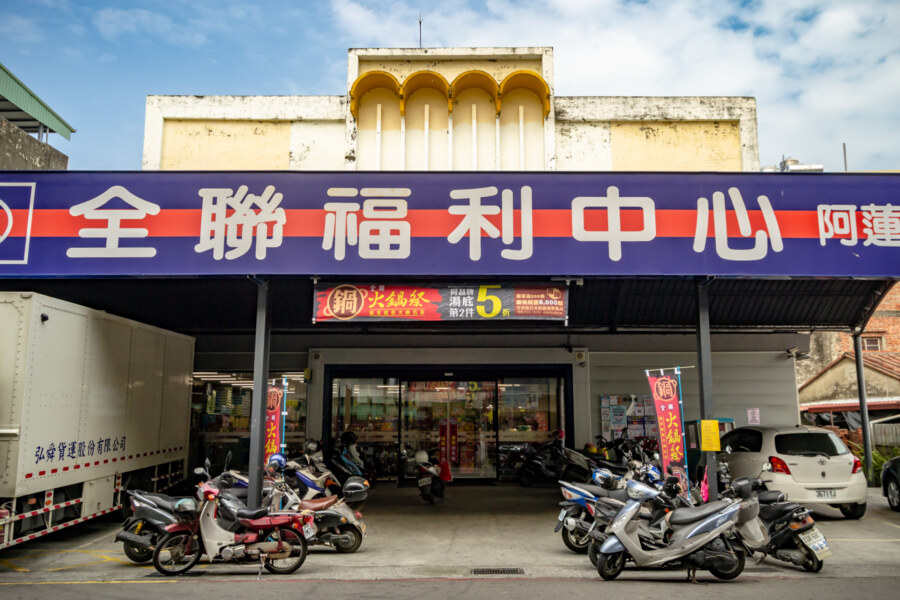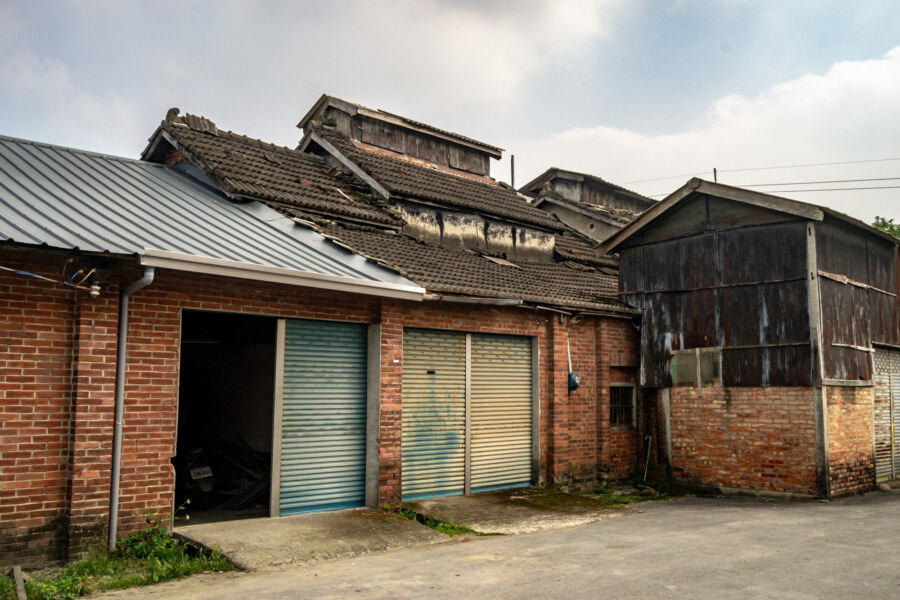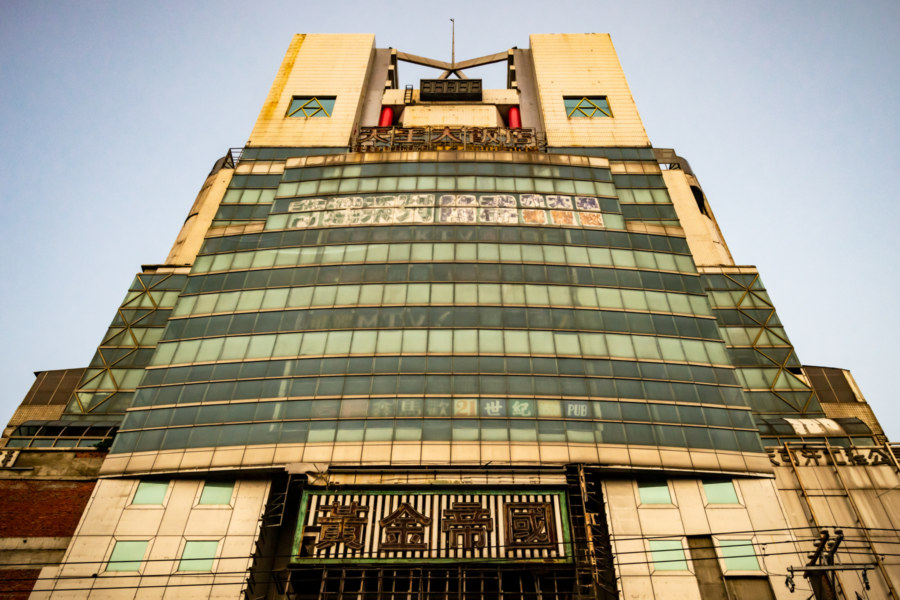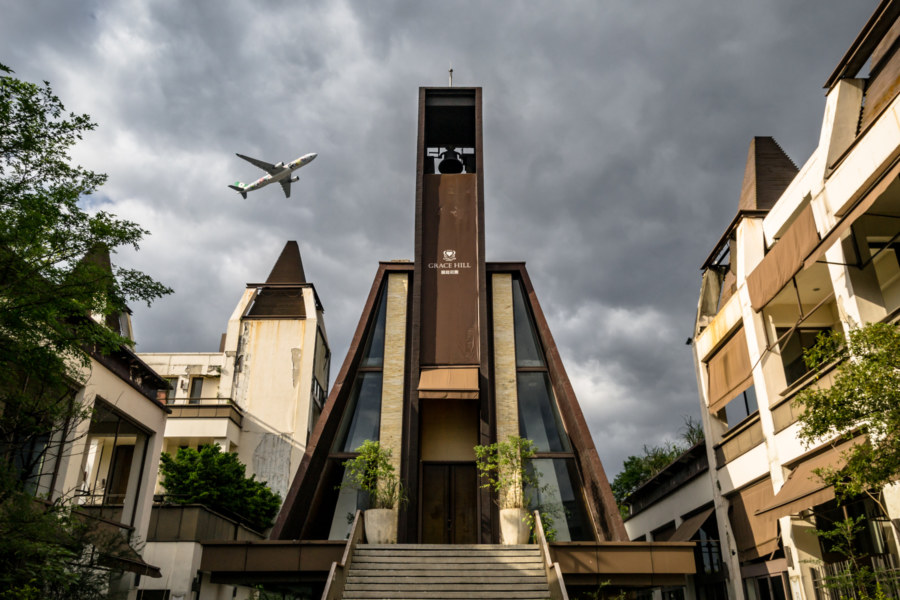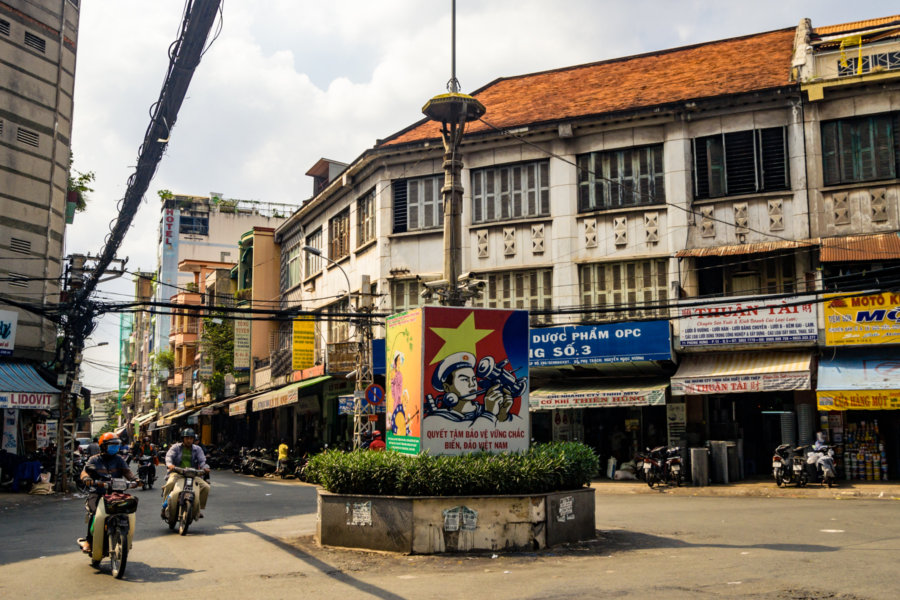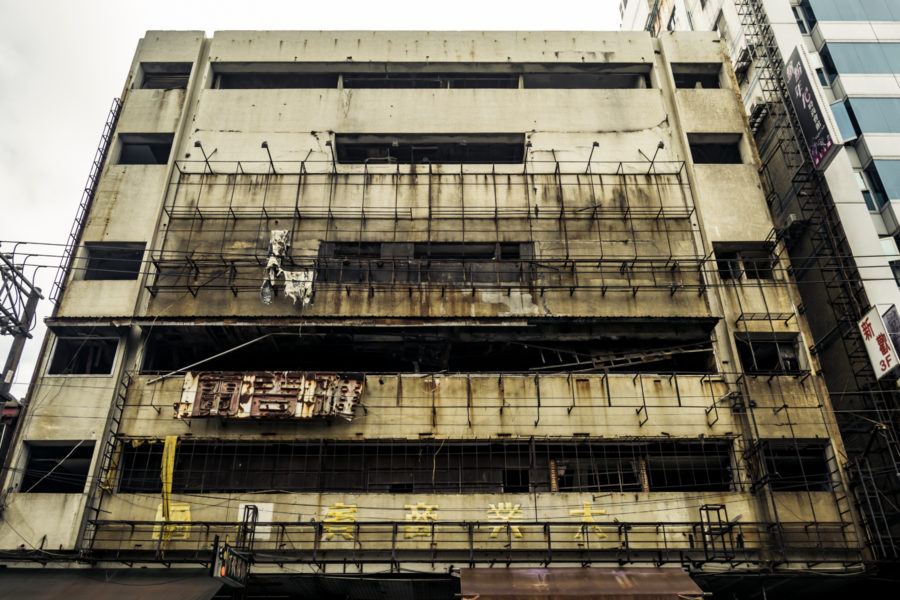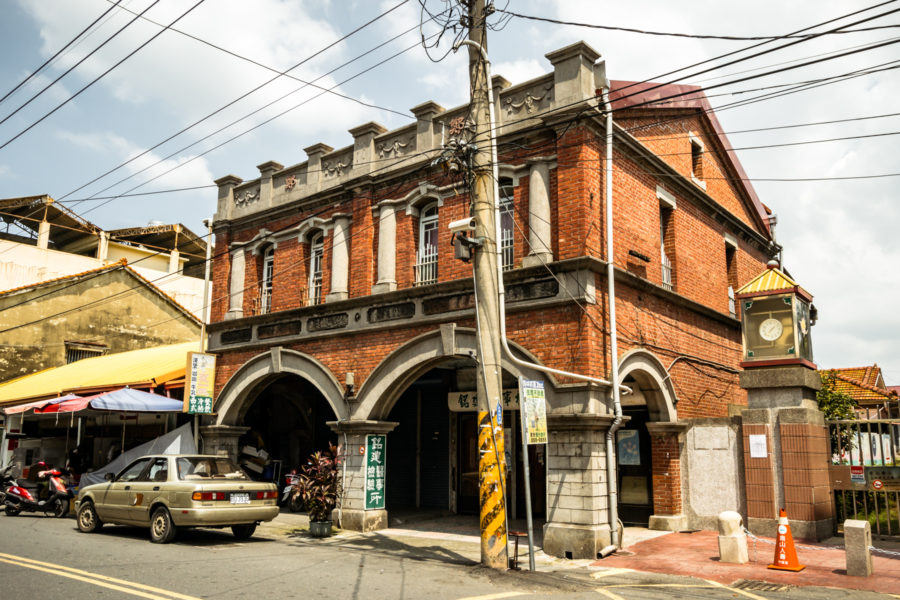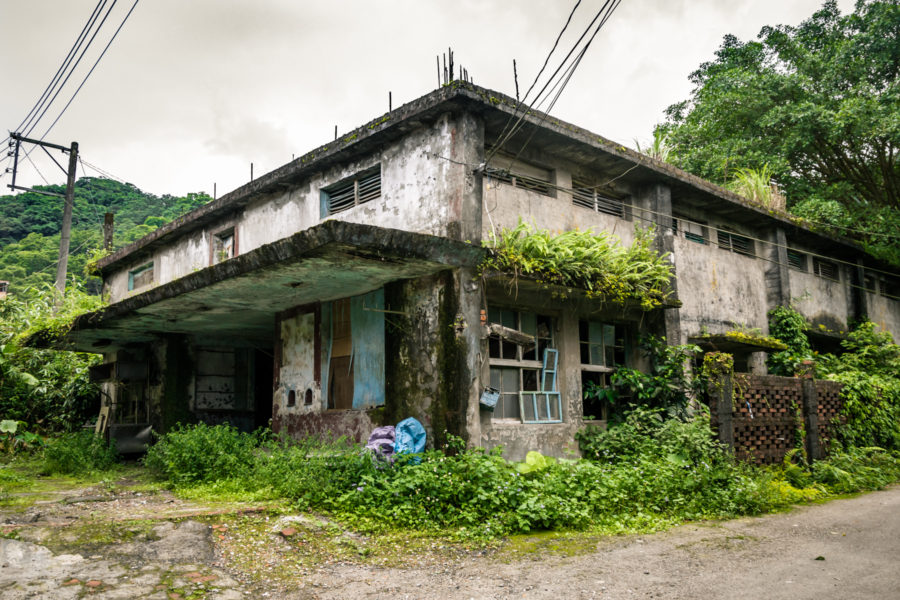The former Miaoli Theater (苗栗戲院) is located in the heart of Miaoli City, a mid-sized settlement of 86,000 residents in north-central Taiwan. Approximately 30 theaters were once found scattered around Miaoli County—with at least 5 located here in the city, but as of 2023 only two of those remain standing (with Guoxing Theater being the other one). Few authoritative sources exist to substantiate the early history of Miaoli Theater, but evidence indicates it was operating in the 1950s, and movies were shown all the way into the early 2000s—an unusually long run for a standalone theater from this era. It was eventually sold, shut down, and converted into the Yǒngchāng Animal Hospital (永昌動物醫院), a pet supplies store and veterinarian clinic.
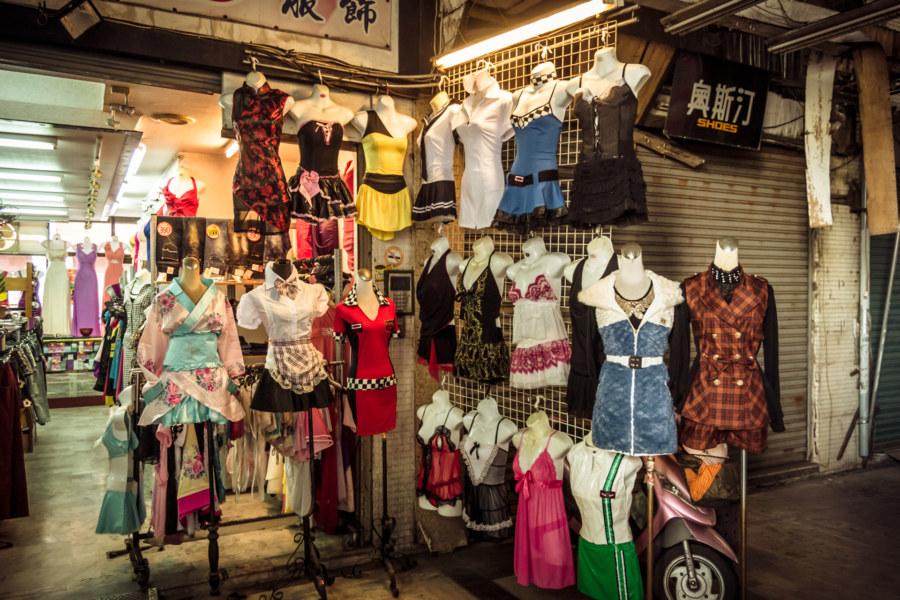
Trading places. See also: residential and industrial.
Adjacent Terms
Alian Theater 阿蓮戲院
Alian (阿蓮) is a rural township at the northern extent of coastal Kaohsiung, right on the border with Tainan, in southern Taiwan. Although it isn’t a very busy place nowadays, it was once home to two movie theaters, only one of which remains in any form. This is the eponymous Alian Theater (阿蓮戲院), in business since the 1960s, and now a branch of PX Mart (全聯福利中心), the largest supermarket chain in the country.
Postcards From Linnei 林內明信片
Linnei is a small rural township located on the south side of the Zhuoshui River in northeastern Yunlin, Taiwan. Despite its strategic position on the Western Trunk Line this township remains mostly pastoral and undeveloped, with little industrial activity compared to neighboring Douliu, the administrative seat of the county. Population in the township peaked at nearly 23,000 in the 1970s and has been declining ever since, recently falling below 18,000 as rural flight continues apace. Nowadays the local economy mostly revolves around agricultural products such as rice, bamboo, and tea, but Linnei was once a major center of tobacco cultivation, traces of which can be found scattered across the countryside.
Postcards From Yuanlin 員林明信片
Yuanlin is a modest settlement of approximately 125,000 residents located on the Changhua Plain (彰化平原) in eastern Changhua, Taiwan. It was formerly the most populous urban township in the nation, but Yuanlin was upgraded to a county-controlled city in 2015, second only to the administrative capital, Changhua City. Considerable work has been done in recent years to improve the urban environment of Yuanlin, and it feels like one of the few places between Taichung and Tainan that isn’t falling into disrepair and emptying out. That being said, urban decay remains widespread in Yuanlin, and there are many interesting ruins worth exploring before they disappear. For students of city planning and development this compact city also has quite a lot to offer—and in this post I aim to introduce some of its more intriguing features, mainly drawing upon photographs from 2013 to 2015, when I was spending significant amounts of time in the area.
Yuanlin Credit Union 員林信用合作社
Yuanlin Credit Union 員林信用合作社 was a small town bank from Yuanlin, Taiwan, that went out of business at the turn of the century. It originated with a Japanese colonial era credit union founded in 1914 and based out of a long-vanished red brick building directly across from Yuanlin Station 員林車站, a plot of land now occupied by the doomed Golden Empire Building 黃金帝國大樓. In the post-war chaos the original credit union was renamed and reorganized several times, eventually giving birth to the credit union that constructed this particular branch, possibly in the late 1960s or early 1970s.
Grace Hill 麗庭莊園
Grace Hill (Lìtíng Zhuāngyuán 麗庭莊園) is a former wedding venue situated in an industrial park in Neihu, Taipei. It opened in 2005 under the management of the Zhǎngxìng Wedding Company (長興婚禮事業有限公司), an outfit keen to disrupt the local market with a larger, more extravagant space for weddings and other events. The business struggled at first but became more widely known after it was featured in television series, music videos, and the news. In 2007 the space was leased to Dears Brain (迪詩), a Japanese wedding company hoping to enter the Taiwanese luxury wedding market. The original owners took a step back, ceding control of day-to-day operations to Japanese management, and the business continued to grow over the next several years.
Postcards From Cholon
Cholon is a historic Chinatown west of old Saigon in Ho Chi Minh City, Vietnam. I visited the area on three occasions in 2017, intent on wandering around and capturing some pictures from the streets. Previously I published an extensive report on the Chinese temples of Cholon, including some detail about the history and demographics of the area, so I won’t repeat myself in this post. Instead, I’ll let the photos do the talking this time around…
Guobin Commercial Building 國賓商業大樓
Guóbīn Commercial Building 國賓商業大樓 is an ugly ruin in the heart of Zhongli, a city of around half a million people in Taoyuan, Taiwan. Built at the dawn of the booming 1980s, it was home to a variety of entertainment businesses over the years, and appears to have been mostly abandoned sometime around the turn of the millennium. Much to my surprise I’ve not found much about this place online, which suggests whatever newsworthy calamities befell this derelict commercial building predate the era of digital journalism. Without any sources to draw upon I can only make some educated guesses about what I captured during a brief visit in the early days of 2017.
Postcards From Ershui 二水明信片
Ershui is a rural township located in the southeastern corner of Changhua, bordering Yunlin and Nantou. Ershui Station 二水車站, constructed in 1935, is the primary point of transfer between the Main Line 縱貫線 of the Taiwan Railway Administration (TRA) and the Jiji Line 集集線, a tourist railway leading into the interior. Ershui, which literally means “two water”, is named after the Bābǎo Canal 八堡圳, an extensive system of artificial waterways still responsible for irrigating much of the Changhua Plain 彰化平原 three centuries after it was devised. During the Japanese colonial era this small town prospered as a center of woodworking while farmers in the countryside cultivated bananas, grapes, guava, and tobacco, among other crops. Nowadays it is mainly known as a sleepy stopover on the way to parts beyond—but a closer look will reveal several points of interest for anyone curious about Taiwanese history, architecture, and vintage style.
Shifen Luxing Theater 十分陸興戲院
Lùxìng Theater 陸興戲院 was one of the very first abandoned buildings I explored in Taiwan after arriving back in 2013. I had only been in Taipei for about a week when I took a day trip out to Pingxi, a popular tourist destination in New Taipei, and disembarked from the train at Shífēn Station (十分車站) on a whim. Everyone else on the train had the same idea—which meant the narrow street leading east to Shifen Waterfall (十分大瀑布), reputedly one of finest in the Greater Taipei Area (and my intended destination), was immediately overwhelmed with pedestrian traffic.
